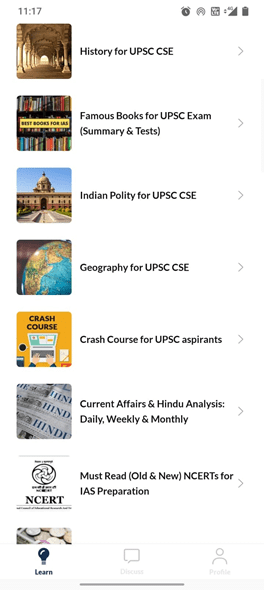Syllabus & Strategy to Study Geography for UPSC CSE Prelims | Geography for UPSC CSE PDF Download
Geography is an essential part of the UPSC Syllabus. It is an interesting subject and unavoidable too since it is a vital part of General Studies Paper I (IAS prelims exam). Geography is scoring and has an average of 18-25 marks weightage in the prelims exam every year.
Importance of Geography as a subject
Geography as a module in General Studies has at least 15-20% weightage is given in prelims and 40% weightage in GS PAPER 1 in mains examination. You need to prepare this topic properly as such weightage gives a good chance for your selection in the exam.
- Also, geography has ‘overlapping’ topics that cover Environment, Economics (Human geography- Demography), Disaster Management, and Current Events. With this, Geography weightage increases to around 30 to 35% in prelims.
- Due to the overlapping nature of questions, and the increase in weightage given to the Environment, Geography becomes even more important.
How to Prepare for Geography
The experts of EduRev, who've mentored thousands of students, including Anudeep Durishetty AIR 2017, Monica Kishore AIR 41 2018, Swati Sharma AIR 18 2019 & others, have compiled the syllabus & strategy for Geography to help you prepare smartly for the exam, by providing you with the right guidance and relevant information. Our objective is to ensure that you should study what actually matters in the exam.
Step 1: Understand the Syllabus of Geography
Indian and World Geography – Physical, Social, Economic Geography of India and the World. The syllabus in the official notifications mentions only 1 line for UPSC Prelims Geography, EduRev team has explained the topics for your understanding researching from previous year papers & best books recommended by the toppers:
1. Indian Geography
- Basics of India: Location, latitude, longitude, time zone, etc.; Neighbours, Important straits; States and their position, States with international boundaries
- Physical features, The Himalayas – geological formation, climate, vegetation, soil, biodiversity, physiographic divisions, major passes, significance; The Great North Indian Plains – geological formation, physiographic divisions, climate, vegetation, soil, biodiversity, significance; Peninsular Plateau – geological formation, Central Highlands, Deccan Plateau, Western Ghats, Eastern Ghats; Indian Desert; Coastal plains and islands
- River systems: Himalayan rivers; Peninsular rivers; River basins; Regional development and planning; Hydropower projects, major dams; West-flowing and east-flowing rivers; Interlinking of rivers
- Climate: Monsoons – driving mechanism, El Nino, La Nina; Seasons; Cyclones
- Minerals and industries – mineral distribution, industrial policies, location
- Agriculture: Land utilization; Types of agricultural practices; Green revolution; Soils and crops; Irrigation; Land reforms; Animal husbandry; Government schemes
- Natural vegetation and fauna: Classification of natural vegetation; Rainfall distribution; Biosphere reserves, national parks, etc.; Red-listed species
- Economic infrastructure: Transportation (highways, inland waterways, etc.); Power and energy sector; Conventional and non-conventional sources of energy; Energy conservation
- Human Geography: Demographics; Recent census
2. World Geography
- Major natural regions; Regional geography of developed countries; Regional geography of developing countries; Regional geography of South Asia
3. Physical Geography
- Geomorphology: Origin of the earth; Interior of the earth; Types and characteristics of rocks; Folding and Faulting; Volcanoes, earthquakes; Interior of the earth; Weathering; Landforms formed by fluvial, aeolian and glacial actions
- Climatology: Atmosphere – structure and composition; Temperature; Pressure belts; Wind systems; Clouds and types of rainfall; Cyclones and anti-cyclones; Major climatic types
- Oceanography: Ocean relief; Temperature, salinity; Ocean deposits; Ocean currents; El Nino and La Nina; Waves and tides
- Biogeography: Soil – origin and types; Major biomes of the world; Ecosystem, food chain; Environmental degradation and conservation
4. Human Geography
- Man & environment; relationship, growth and development of human geography; determinism and possibilism
- Population, tribes, migration
- Economic activities– agriculture, manufacturing, industries, tertiary activities
- Settlements, urbanization, functional classification of towns, million-cities and megacities
Location-based questions pertaining to India and the world are also asked in the prelims.
Step 2: Analyze Previous Year Questions (PYQs)
Once you’re through the syllabus, pick up the previous year's papers and skim through them to get an understanding of what is actually asked in the exam.
- Solving previous year prelims question papers can aid a candidate in understanding the nature of questions and prepare accordingly.
- Look for the source that gives topic-wise questions of previous years. So that you can have a complete understanding of each topic and the type of questions asked.
- You can get the last 10-years of UPSC Prelims & Mains papers from here - UPSC Previous Year Question Papers.
- You can also refer to the topic-wise questions of Geography from the last 25-years here.
Step 3: Build your Foundation: NCERTs
- Read NCERT books thoroughly to build your foundation. The best source for geography is NCERT books. Depending on the level of understanding, one can read NCERT books from 6th to 12th class.
- If one faces a lot of difficulty in understanding geography, then one should read it from the 6th class. But if one finds geography quite easy and already has decent knowledge about geography, he/she can directly read 11th and 12th NCERT books.
Must Read NCERTs for Geography are:
India Physical Environment- NCERT (Class 11th),
Fundamentals of Physical Geography (Class 11th),
Fundamental of Human Geography (Class 12th)- All the Class 6 to Class 12 NCERTs for Geography, available here
- Attempt NCERT based tests to test your learnings and strengthen your foundation.
- Read Chapter Wise & Subject Wise NCERT summaries for quick revision.
Step 4: Read Important Reference Books: GC Leong & Others
Goh Cheng Leong for Geography is one of the finest and important books for the exam. It is the most recommend book by all the toppers for the Indian and the World Geography.
- Read and go through the book once without highlighting it.
- On second reading highlight the key points.
- Note down the key points and try summarizing in 2 to 3 pages.
- Make separate sections for Region, Climatic Features, Economy, Problems, Vegetation And People and note down the key points in these separate sections.
- You can find summaries & MCQ tests for all the topics of GC Leong here.
Here's the list of other important books you can refer to once you are done with GC Leong
- Human Geography by Majid Husain
- Models in Geography by Majid Husain
- India: A comprehensive Geography by DR Khullar
Step 5: Perfect Your Concepts through Video Lectures & Detailed Notes
- Once you've studied all the mentioned books, you should refer to a single source of notes & video lectures which will help you to strengthen the concepts and understand the same topic from a different perspective.
- This will give you a fair idea of Geography subject and will help you to keep things in mind for a longer period of time.
- Regular revisions through notes and video lectures can help strengthen the basics and boost one’s confidence in the subject. You can get topic-wise notes & video lectures in the Geography course on EduRev, available on this link
Step 6: Attempt Topicwise Tests

- MCQ Tests on all the topics (& sub-topics) of Geography subject are helpful for clear understanding, proper practice, and quick revision. These tests will help you in self-evaluation and you can check, whether you've understood a topic completely.
- Attempting Topicwise Tests will give you a fair idea about the type of questions being asked in recent years. It will also help you in revising effectively and efficiently.
- You can get topic-wise tests in the Geography course on EduRev, available on this link
- You can get the previous years' papers of UPSC Prelims & Mains here.
- And questions from the last 25-years of UPSC prelims are arranged topic-wise here.
Step 7: Focus on Newspapers, Magazines & Current Affairs
- Current affairs are another important area with respect to Geography topics.
- For the dynamic part, you should stay updated with current affairs as questions are asked in a way that both the current affairs and the static portion are interlinked.
- You can go through current Affairs from the monthly & weekly compilation to study the recent updates related to geography, which you can easily find here.
- Read editorials from the Hindu and articles from monthly magazines like Monthly Yojana Magazine (English) and Kurukshetra and prepare notes from them. Next, keep revising them to retain the concepts.
- Stay updated with current affairs from Current Affairs & Hindu Analysis: Daily, Weekly & Monthly course on EduRev.
Step 8: Refer to Oxford Atlas & Practice Map Section
- Refer to ATLAS of Oxford to practice the map section which you find easily on EduRev.
- Refer UPSC Previous Year Question Papers to know which types of questions come for Map Section.
- While studying the map, one should read it feature-wise, for example- if the rivers of India are being studied then on that day all the rivers should be studied.
- After studying the map, one should close the book and try to visualize the location in the mind.
- Try to draw a rough map on the blank sheet of paper and mark on it whatever one has studied.
- You can find ATLAS: Map-based learning videos & MCQ tests here
Step 9: Improve Your Understanding by Answer Writing
- As the pattern of the paper is evolving the candidate's horizontal expansion of the knowledge as well as the vertical limit of understanding of the topic is expected in a balanced proportion.
- There are a number of events happening around the year and the candidates have to take a close watch on the current scenario and recommend monthly current affairs for better understanding on the same.
- EduRev’s course on Essays provides you with sample essays to help you understand the pattern of essays.
- You should keep practicing by making your notes around various topics.
Step 10: Attempt Mock Tests of Geography
Attempt mock tests to understand your level of preparation and for self-evaluation.
You can find subject-wise mock tests of Geography in the UPSC CSE Prelims Mock Test Series.
EduRev has provided all the study material & tests which matters in your preparation for UPSC, compiled under multiple courses. You can refer to this document “How to study Geography using the EduRev App? ” to understand it better & ace the exam smartly.
Other Important Links
1. Courses for all the subjects with detailed notes, video lectures & tests are available on EduRev:
History for UPSC CSE, Geography for UPSC CSE, Indian Polity for UPSC CSE, Science & Technology for UPSC CSE, Economy for UPSC CSE & others.
2. Check-Out subject wise Syllabus, Booklist & Strategy from these links:
- Syllabus & Strategy to study History for UPSC - CSE Prelims
- Syllabus & Strategy to study Science & Technology for UPSC-CSE Prelims
- Syllabus & Strategy to study Indian Polity for UPSC - CSE Prelims
- Syllabus & Startegy to study Indian Economy for UPSC - CSE Prelims
- Syllabus & Strategy to study Environment for UPSC-CSE Prelims
Happy Learning with EduRev!
|
175 videos|472 docs|197 tests
|
FAQs on Syllabus & Strategy to Study Geography for UPSC CSE Prelims - Geography for UPSC CSE
| 1. Why is geography considered an important subject for UPSC exams? |  |
| 2. How should I start my preparation for geography for the UPSC exam? |  |
| 3. Which books are recommended for studying geography for the UPSC? |  |
| 4. How can I effectively revise geography concepts for the UPSC exam? |  |
| 5. Why is it important to stay updated with current affairs while studying geography? |  |

|
Explore Courses for UPSC exam
|

|


















